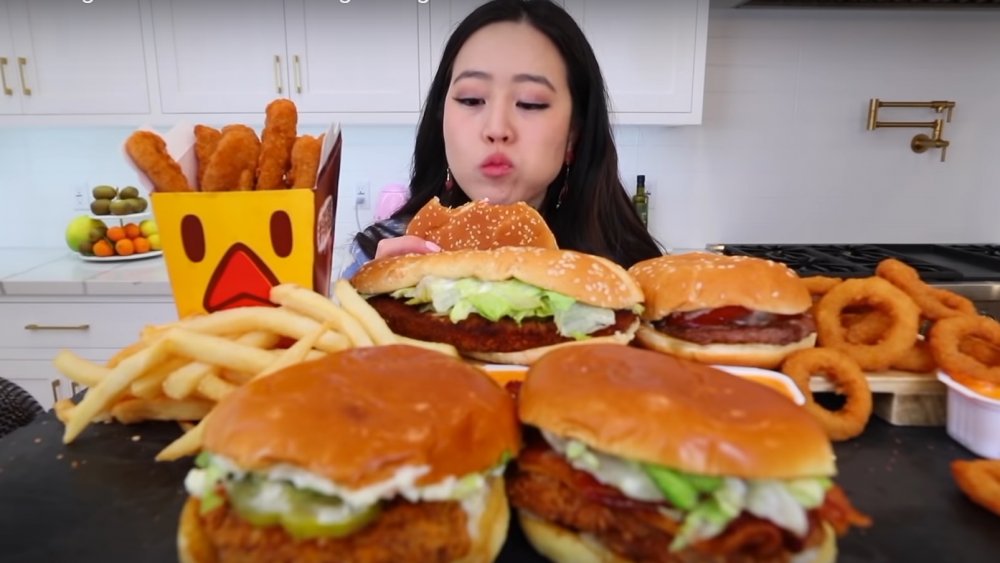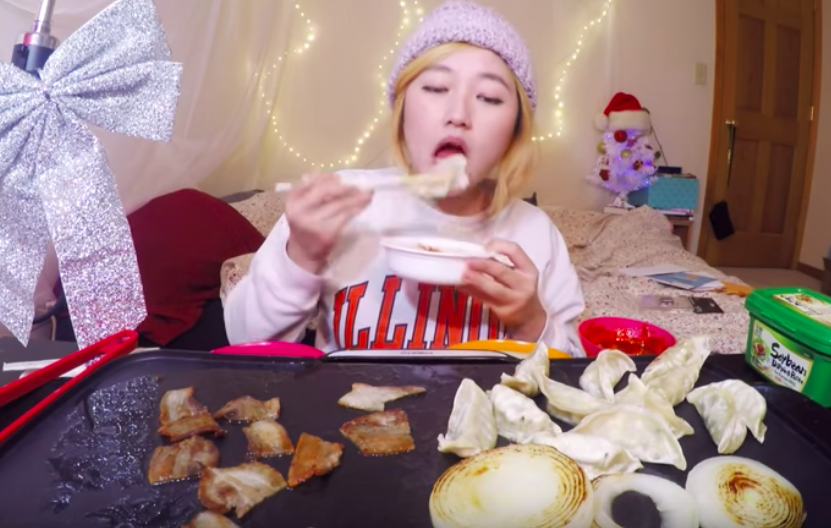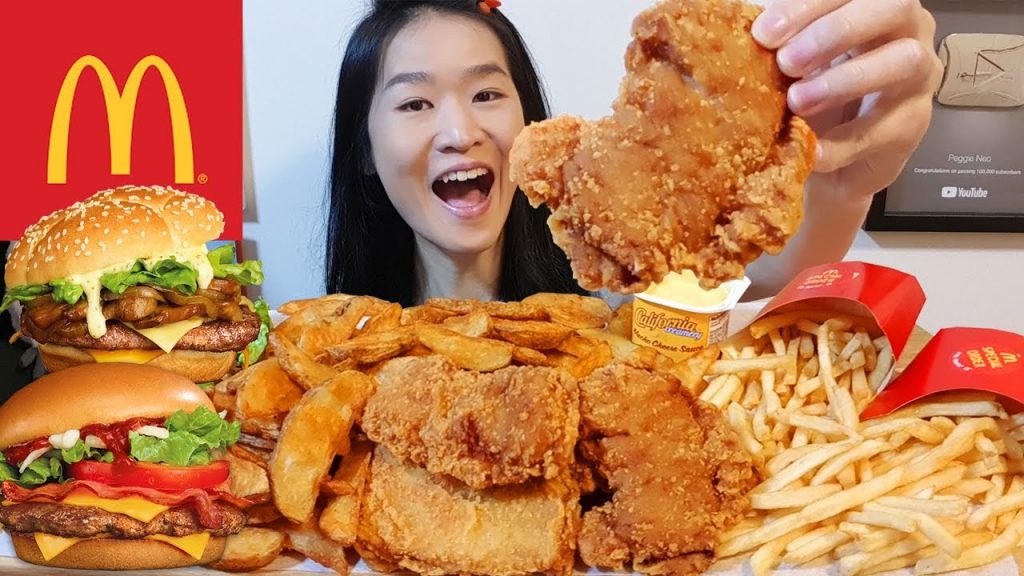It is one of my most favorite thing to do whenever I’m stressed or just feeling ‘meh!’ I watch people eat and it is so soothing that I suddenly less stressed and happy. It is a mukbanging. Mukbang or an eating show is an online audiovisual broadcast where the host eats food while interacting with audience. Mukbang is a mashup of two Korean words: ‘mukja,’ or ‘let’s eat’; and ‘bang song,’ meaning ‘broadcast.’ The mukbang pronunciation is a bit tricky to get right. Most Western Mukbangers pronounce it exactly as it looks: “muck-bang.” But, in Korean, it’s pronounced “mook-bong” or “moak-bahng.” You’ll also see it romanticized sometimes as meokbang. It started in South Korea in the year 2010, and since then it has become a trend worldwide. There is a wide varieties of foods, ranging from pizza to noodles are consumed in front of camera. Believe it or not, these food-crazed YouTube stars make a lot of money eating money!

It is a live-streamed eating show where the host binge-eats, but it is often more than that, for some hosts cooks the food on camera first, then eats it. There are some videos that have a feature noisy sound effects and descriptions of the food, while the other videos show the host eating quietly.
Mukbang videos are usually live-streamed on a Korean platform called Afreeca TV, where viewers can leave comments in real time and encourage the host to eat more or eat something related to their county or mix it with something different. It has since migrated to other video platforms, like YouTube. You will definitely find Mukbangers from all over the world who upload their videos instead of live streaming it.
With a growing audience, Mukbangers are always a novelty in this era. As expected, there are a lot of Korean Mukbangers, such as:
Min Ga-in, also known as Dorothy, is a Korean YouTuber best known for posting mukbang videos and spicy food challenges.
Stephanie Soo – Stephanie Soo, also known as MissMangoButt, is YouTuber who posts mukbang videos and food reviews. Her second channel features vlogs and fashion.

Keemi Kim (born June 1, 1990) is a Korean YouTuber who publishes “How To” recipe videos to her 650,000 subscribers on her eponymous channel.

Hyunee (born May 22, 1990) is a Member of the mukbang community on YouTube who is seen eating large quantities of a variety of types of food.
There are many Mukbangers from other countries who deserve all the lauds, they are:
Veronica Wang (born June 18, 1992) is a Canadian YouTube star who is widely known for her self-titled channel. She has gained popularity there for her food vlogging, including tutorials, taste tests, and challenges. One of her most popular YouTube videos, “EXTREME SPICY NOODLE CHALLENGE / RACE MUKBANG 먹방 | 13K GIVEAWAY,” has amassed more than 4.5 million views.
Bethany Gaskin (born April 2, 1975) is a food YouTuber who launched her YouTube channel Bloveslife in January 2017. The channel rapidly earned more than 310,000 subscribers through food challenges, vlogs, recipes, and more. One of her most popular YouTube videos is the June 2017 video titled “Seafood boil 5 Smacking Noises/Messy Eating/King Crab/Lobster/Shrimp.”
Peggie Neo (born January 6, 1986) is a food enthusiast widely known on her self-titled channel for her litany of mukbangs and food challenges. She clinched the #1 spot on the YouTube Rewind 2017.

Yuka Kinoshita (born February 4, 1985) is a competitive eater with an enormously successful YouTube channel to match her appetite that has earned more than 4 million subscribers. She can eat enormous quantities of food with little health consequences. Doctors determined that she has a unique stomach which can expand to fill all of the space within her body, which is how she can eat so much. In addition to YouTube profits, she earns additional money from promoting the restaurants where eating competitions take place.
A Korean-American guy who is known for his silent videos where he simply eats and sometimes cooks.
Well, the trend is continuing to grow in popularity, where the Mukbangers receive donations from viewers or partner with sponsors. Some Mukbangers make hundreds of thousands of dollar annually and some use mukbanging as their full-time job.
However, there is one question that all new viewers of a mukbanging ask, “is there any risk when it comes to over-eating?” Well, nutrition experts indicate the potential risks and benefits of the growing trend.
What Are the Risks of Mukbang?
Watching mukbang is primarily up to the viewer’s discretion. However, nutrition experts warn it may promote overeating and encourage poor eating habits.
Mukbang may promote overeating.
After watching some of the clips, there is not much question the “broadcast junkies” overindulge on mass amounts of food. They mostly overeat on packs of ramen noodles, fried chicken, pizza, and the list goes on.
This ultimately raises the concern on whether or not they are promoting overeating and binge eating. Or, if they are simply aiming to grab the attention of its viewers and gain more of them.
But nonetheless, the massive portions of foods are consumed and keeps viewers tuning back in.
Mukbang may encourage poor eating habits.
Research suggests it takes, on average, 21 days to form a habit. So if consistently gorging on high volumes of food, we must wonder if poor eating forms are likely to form.
Glamorizing high portions may not only accelerate large meal plates but rising the intake of poorer nutrition choices.
Partaking in mukbang likely comes with health risks.
Eating large plates can start linking mukbang and weight gain. This can, in turn, increase the risk of weight-related health conditions such as type 2 diabetes and heart disease.
What’s more, watching may be a trigger for disordered eating patterns and come with its own subset of risks.
What Are the Benefits of Mukbang?
Ending on a positive note, mukbang may offer some sort of benefit to viewers. Because on the flip side of the coin, nutrition experts suggest the videos may break diet barriers. It also brings people together from around the world.
Mukbang may help break down barriers related to diet culture.
Today’s diet culture tends to place too much emphasis on what you should and should not eat. This is likely an action to reach the right “look.”
Mukbang, on the other hand, may break the stigma of avoiding “bad” foods in such a diet-driven society. This can open up the door for viewers to overcome food avoidance.
In fact, Erik the Electric has overcome anorexia and is open about how starting YouTube channel helped him do so. Viewers have commented watching the videos have made them more comfortable with eating.
This can empower individuals to feel comfortable in their skin, especially as the trend spreads its way to the States.
Mukbang brings people together from around the world.
Those who watch feel involved in a large social connection. They also start building connections with their favorite channels and broadcast junkies.
While viewers are miles apart, tuning in forms a unique unity from the comfort of personal social media accounts.
Mukbang resurfaces a critical health piece many often dismiss: The importance of shared meals. Whether it be with friends, family, neighbors, meals consumed together is a growing lost art.
The slip of communal meals can be related to busy schedules, living alone, or any other life circumstances and situations. Individuals who tune into the Korean trend consistently mention the following theme. This is feeling a sense of community around eating food.
Recognizing and realizing the potential health consequences is vital, though. If struggling with disordered eating, professional help is recommended over watching mukbang.
Finally, these social eating shows are bringing people together from various countries, nationalities, and homes. Also, they are sharing the different cultures to everyone around the world.
